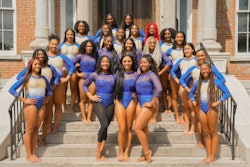Hun Loo “Lincoln” Gong, a self-made billionaire who designed the first chip that enabled laptops to automatically read both Apple and PC software in Chinese and English, was rejected from Harvard in 1981.
He has never forgotten that, nor the fact that it’s impossibly difficult for Asian Americans to get beyond the limitations of top institutions with increasingly high percentages of Asian American students.
“Schools just don’t want to go beyond 30-40 percent Asian,” said Gong. “It’s true for private schools like Harvard or even public schools like UC Berkeley. But think what kind of student body you can have with all those Asian American rejects.”
That’s when the light went off in Gong’s head.
“I never forgot when I was rejected from Harvard, I got a scholarship to attend Lincoln University in Pennsylvania,” Gong said. He didn’t realize it was a historically black school at the time, but applied because his immigrant father would only let him go to a school named after the family hero.
At Lincoln, Gong learned about the purpose of historically black universities, and how they served a real need when blacks were excluded from colleges before the Civil War.
“When you think of it, the exclusion of top Asian American immigrants now is just like it was for blacks back then,” Gong said. “Where are we going to get the best education if we get shut out of the top schools?”
Gong knew of other high level executives in the tech field who were Asian immigrants, now naturalized citizens, but were rejected from their top choices like Harvard, UC Berkeley, and Stanford. Last month, during a poker night in San Jose, Calif., Gong got his millionaire buddies to pool close to $1 billion dollars to create a full-fledged university based in California, that would cater to what he called the “vengeful rejects.”
“Those are the students who want to let Harvard and Berkeley and Stanford know the schools made a great, big mistake,” said Gong, who still speaks with an accent and broken English.
The goal would be to buy real estate in San Francisco as a hedge against the education business. “At least we’ll have the buildings,” Gong said.
Then they will set up a virtual online university that will give opportunities to Asian immigrants abroad to receive American degrees, as well as Asian Americans who got rejected from the top schools.
“We will let them in for a relative small cost, and they can pay us when they make it big,” said Gong. “We have high standards, so I expect all of them to make it.”
The approach is unusual, but Gong said he thought the typical university system was overrated. “We’ll give them what they need to succeed,” he said. “We don’t have to give them Shakespeare. We’re very focused.”
The working name for the school is Vincent Chin University or VCU, named for the iconic Chinese American who was beaten and killed in a racist murder in 1982.
“VCU was also one of my favorite teams in the NCAA tournament” said Gong, who liked VCU because of its coach, Shaka Smart. Gong said this VCU will have at least a chess team to start, but with ping pong and badminton teams added if they are competitive. “We must be able to compete with the world champs in Asia,” he said. “Otherwise, we’ll stick to our studies.”
Due to the current Lunar New Year, VCU will take on the mascot, the Snakes.
“The Snakes will be crafty and un-traditional,” said Gong, “And we won’t be afraid to be 90 percent Asian if that’s the way it goes.”
Gong made his remarks at a special April 1st announcement ceremony in San Francisco’s Chinatown. “Even though Harvard and Berkeley could be Asian American universities if they were honest in their admissions policies, VCU will be the first of this country’s official Historical Asian American Colleges and Universities,” said Gong.
Emil Guillermo is an award-winning journalist and commentator on race and diversity issues. Based in California, he writes for the Asian American Legal Defense and Education Fund www.aaldef.org/blog and www.amok.com



















